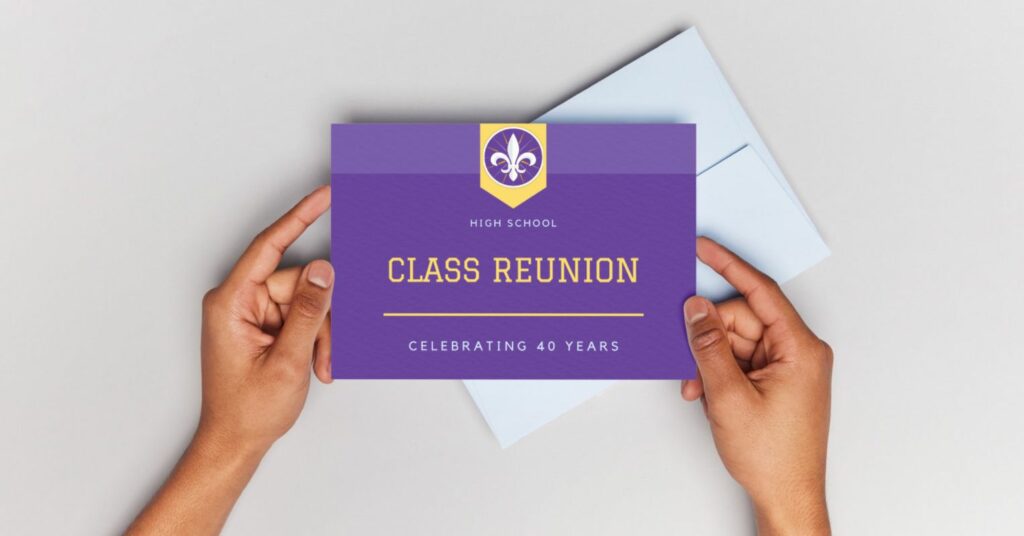When Debbie, my best friend from high school, recently emailed about arranging a 40-year reunion for our high school friends, I was filled with anticipation and nostalgia. How fun it would be to reconnect and reminisce about our adolescence. I remembered our weekend parties, figuring out whose parents would be out of town and sneaking in alcohol. We got our driver’s licenses and cruised around town, feeling on top of the world. We supported each other through high school romances and breakups, both taking on outsized significance in our lives. We spent hours listening to our favorite rock bands in the ’80s: The Police, Duran Duran, Talking Heads, Journey, The Cars, and Air Supply. We celebrated college acceptances, went to prom, and signed yearbooks with promises to stay friends forever.
article continues after advertisement
Here we are, 40 years later, about to meet up with the old gang. Although years have gone by during which I have not been in touch with many of my high school friends, I still feel a strong affection for each friend and a longing to reconnect.
Unbreakable Bonds and Lifelong Connections: The Impact of Belonging
The tenacious bonds that we formed during those early years feel unbreakable. Our connections were not only a source of enjoyment and adventure but also a force that bolstered a sense of belonging. Community is critical for the development of a healthy sense of self-esteem and confidence. The feeling of belonging creates a foundation for connections and community for years to come. When we think back to our high school days, the first memories are generally not about what we learned in biology class. Often, the most visceral memories are about friendships and experiences that elicited strong emotional reactions—hanging out with friends after school, watching soap operas, walking around the mall shopping for the latest trends, and playing frisbee together outside the cafeteria after a quick bite at lunchtime. These experiences profoundly impact how we feel moving forward and shape our sense of personal acceptance, safety, and well-being.
Kim Samuel, founder of the Samuel Center For Social Connectedness and author of On Belonging: Finding Connection in an Age of Isolation, described belonging as an essential need and a sacred right. She writes, “Belonging begets belonging. When a person experiences belonging early in life—at school, at home, in a religious community, a sports team, or a neighborhood—that experience can become a touchstone for the lifelong work of finding social connection, rootedness, and meaning. So, it’s essential to invest in young peoples’ experience of belonging and to reinvest continuously” (K. Samuel, personal communication, July 1, 2024).
article continues after advertisement
Research by Baumeister et al. (2007) highlights the fundamental human desire to establish and maintain enduring interpersonal relationships, emphasizing the importance of feeling connected, needed, and valued by others. This need for belonging becomes particularly crucial during adolescence, as social relationships outside the family gain importance and significantly influence positive adjustment. Additionally, the sense of belonging has a direct impact on academic performance. According to Libbey (2004), being engaged, attached, or bonded to the school environment is strongly associated with various psychological and academic outcomes, including reduced problem behaviors, enhanced self-worth, better grades, and perceived academic competence.
Reunion Jitters: Old Insecurities Resurface
After the initial euphoria of enthusiastically responding to the reunion invitation, my old insecurities flood my mind. Do I look old? Have I gained weight? How will my son’s accomplishments measure up to their kids? Have I been successful enough? Do they remember me as fondly as I remember them?
Embracing the Beauty of Reunion
Finally, I recognize the beauty of this upcoming reunion. I am grateful to be part of this celebration of our adolescent bonds, during which we supported each other through our ups and downs and somehow came out on the other side both older and wiser.
This is not meant to idealize adolescence, which inevitably is filled with angst, insecurities, and struggles with the process of individualization. It is common during these formidable years for there to be conflicts and fallings-out with friends along the way. I have undoubtedly forgotten much of the minutiae of my high school days; however, I recall more clearly than ever the sense of community and belonging. Friendships formed during adolescence are a gift that can bolster a lifetime of connection, self-acceptance, and feeling a part of something greater than oneself.
References
Libbey, H.P. (2004), Measuring Student Relationships to School: Attachment, Bonding, Connectedness, and Engagement. Journal of School Health, 74: 274-283. https://doi.org/10.1111/j.1746-1561.2004.tb08284.x
Baumeister, R.F., Brewer, L.E., Tice, D.M. and Twenge, J.M. (2007), Thwarting the Need to Belong: Understanding the Interpersonal and Inner Effects of Social Exclusion. Social and Personality Psychology Compass, 1: 506-520. https://doi.org/10.1111/j.1751-9004.2007.00020.x
Source link : https://www.psychologytoday.com/za/blog/the-colors-of-contemporary-psychiatry/202407/embracing-my-40-year-high-school-reunion?amp
Author :
Publish date : 2024-07-02 20:31:40
Copyright for syndicated content belongs to the linked Source.
